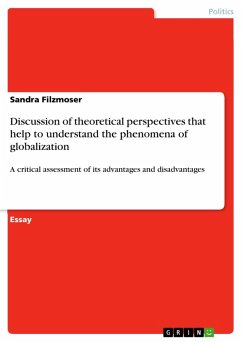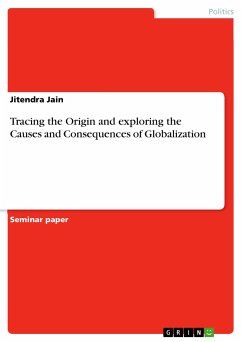Essay from the year 2011 in the subject Politics - Topic: Globalization, Political Economics, grade: 1, University of Bologna (MIREES - International Research and Studies on Eastern Europe), language: English, abstract: Beynon and Dunkerley say that the historic roots of globalization are from the fifteenth century on. They claim that Europeans developed an 'outward-lookingness' which made them explore the world in contrast to other powerful nations. The era of exploration originated the first 'world city', namely Lisbon because of its accessibility by boat. This step towards globalization led to the expansion of knowledge in technology, geography and even of the mind, what Spybey terms 'global consciousness'. Furthermore the longing to spread the European culture, and most striking the perception of European time and the concept of the nation-state. "[E]xamining the relationship of nation and globalization will revise our understanding of the crisis of the national state." "[C]ontemporary globalization is not reducible to a single, causal process, but involves a complex configuration of causal logistics." But "the following are among globalization's most significant foundational factors: The expansion of trading relationships and the use of symbolic tokens, of which money is an obvious example; Copernicus' concept of the world as a globe; The invention of navigational aids and the steady advance of travel technologies (...); The outward expansion of European institutions and culture; Capitalism's insatiable drive to maximize profit leading it to 'go global in its postmodern phase and to open up and exploit new markets with new products."
Dieser Download kann aus rechtlichen Gründen nur mit Rechnungsadresse in A, B, BG, CY, CZ, D, DK, EW, E, FIN, F, GR, HR, H, IRL, I, LT, L, LR, M, NL, PL, P, R, S, SLO, SK ausgeliefert werden.









